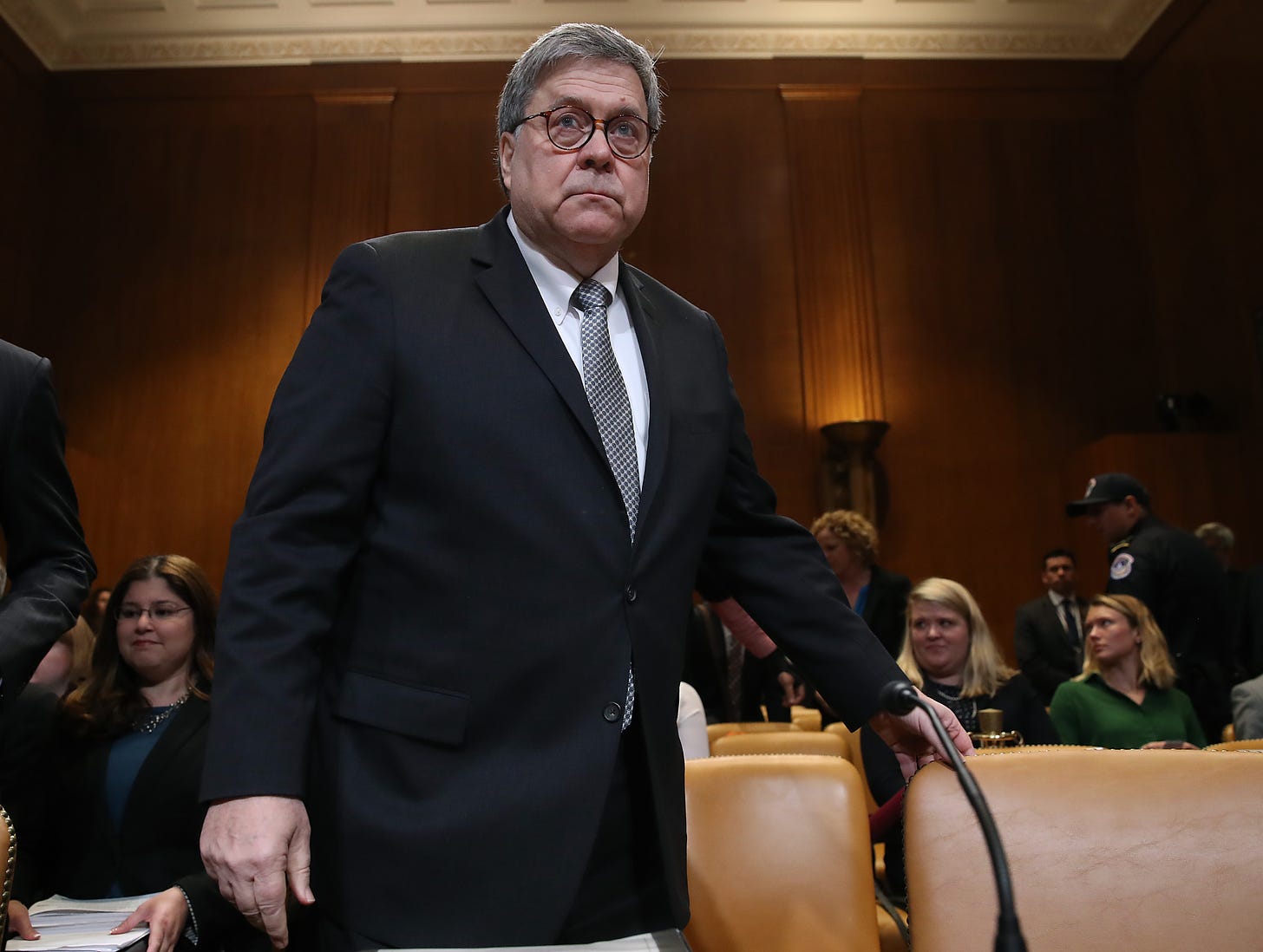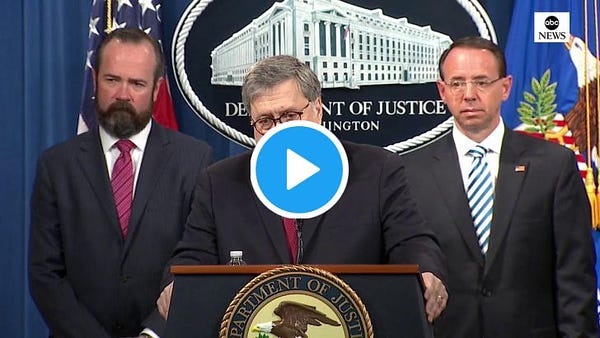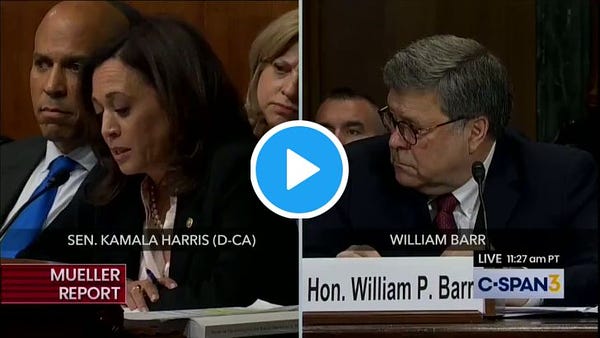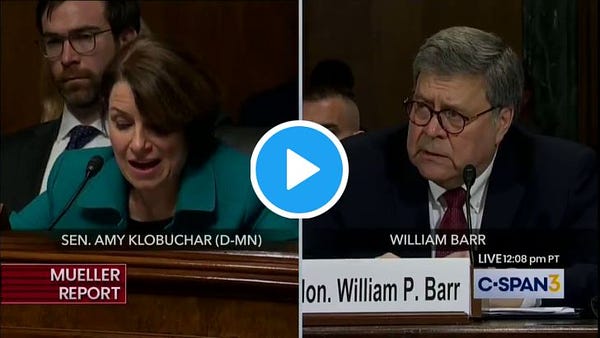On Thursday, a federal judge ordered the Department of Justice to deliver a copy of Special Counsel Robert Mueller’s un-redacted report to the court while taking aim at Attorney General William Barr in his ruling by accusing him of misrepresenting Mueller’s findings in the days leading up to submitting it to Congress.

(U.S. Attorney General William Barr appears before the Senate Appropriations Committee on April 10, 2019 in Washington, D.C., one day after testifying to the House where he faced many questions about the Mueller report. Photo by Mark Wilson/Getty Images.)
Judge Reggie B. Walton, a federal district court judge in Washington, is reviewing this case as a result of two Freedom of Information Act suits claiming that the D.O.J.’s privileged classification for the Mueller Report is improper and that the redactions need to be reviewed by an independent party. Walton expressed his difficulty in reconciling A.G. Barr's public comments about the report with what was actually contained in the Mueller Report. Walton also cited a “lack of candor” on Barr’s part and that “call[s] into question Attorney General Barr’s credibility.”
"The inconsistencies between Attorney General Barr’s statements, made at a time when the public did not have access to the redacted version of the Mueller Report to assess the veracity of his statements, and portions of the redacted version of the Mueller Report that conflict with those statements cause the Court to seriously question whether Attorney General Barr made a calculated attempt to influence public discourse about the Mueller Report in favor of President Trump despite certain findings in the redacted version of the Mueller Report to the contrary. These circumstances generally, and Attorney General Barr’s lack of candor specifically, call into question Attorney General Barr’s credibility as well as the DOJ's arguments in a Freedom of Information Act (FOIA) lawsuit.” — Judge Walton in his ruling
The judge said that A.G. Barr's public statements about the report have led him to question the veracity of the redaction arguments made so far by the D.O.J. and whether those redactions are actually proper. Walton went on to say, "The Court has grave concerns about the objectivity of the process that preceded the public release of the redacted version of the Mueller Report and its impacts on the Department’s subsequent justifications that its redactions of the Mueller Report are authorized by the FOIA."


Judge Walton has stated that he intends to review the full report in order to confirm that the D.O.J. redactions are warranted and appropriate. The judge also intends to review whether the redactions that have been made are subject to a current Freedom of Information request (F.O.I.A.)
Walton is currently presiding over two consolidated F.O.I.A. suits brought by Jason Leopold, a Buzzfeed journalist, and the nonprofit Electronic Privacy Information Center (E.P.I.C.). Both parties are demanding that the Justice Department be ordered to release the full, un-redacted version of Mueller’s Report to the public. Judge Walton has also confirmed that the un-redacted version of the report will not be released to the public in the interim while he is reviewing it.
Judge Walton, who was appointed to the federal bench by George W. Bush, seemed to focus the crux of his opinion on the public statements made by William Barr leading up to the April 18, 2019 release of the Muller Report. Walton also focused his ruling on Barr’s March 24 letter, where the attorney general chose to summarize the findings of the report before sending it to Congressional Committee Chairs. In his letter, Barr told Congress that the Mueller probe did not turn up evidence “the Trump campaign or anyone associated with it conspired or coordinated with Russia in its efforts to influence the 2016 U.S. presidential election.”


Barr went on to explain that the evidence Mueller presented “does not establish that the president was involved in an underlying crime related to Russian election interference.” According to Barr, this premise was the reason Mueller decided not to make a traditional prosecutorial recommendation in the obstruction of justice portion of the report. At the time of Barr’s letter, there was substantial controversy surrounding his decision to summarize Mueller’s intentions without any direct testimony or explanation from Mueller or his team.
In his ruling, Judge Walton also took issue with a press conference Barr held immediately before the Justice Department released the Mueller report and downplayed the report’s findings. Walton found that there was an apparent effort by Barr to soften the impact of the Mueller report and that this initiative raises questions about whether the Justice Department has made appropriate redactions and whether the exempted status the D.O.J. used for the report under the Freedom of Information Act is proper.


Judge Walton said that all of the evidence surrounding Barr’s statements and actions make the explanations given by the D.O.J. “misleading at best,” especially considering that the Mueller Report did turn up evidence of contacts between people associated with the Trump campaign and Russia. Moreover, even if these “associations” do not constitute a conspiracy as defined under federal criminal law, at the very least Barr’s summary of the obstruction portion significantly downplayed Mueller’s actual findings and conclusion.
Judge Burke has ordered the D.O.J. to hand over the un-redacted Mueller Report by March 30.
UPDATE: Department of Justice spokesperson Kerri Kupec issued a statement today that labeled Judge Walton’s assertions as “contrary to the facts,” but did not elaborate on what Walton actually got wrong in his accounting of the “inconsistencies” between what Mueller’s report said and how Barr described it before its release.
Kupec went on to state: “In response to FOIA requests, the entire report was then reviewed by career attorneys, including different career attorneys with expertise in FOIA cases — a process in which the Attorney General played no role. There is no basis to question the work or good faith of any of these career Department lawyers. The Department stands by their work, as well as the Attorney General’s statements and efforts to provide as much transparency as possible in connection with the Special Counsel’s confidential report.”
The Department of Justice has not yet given any information on whether they intend to appeal the ruling made by Judge Walton. Stay tuned.
Your paid subscriptions allow me to keep publishing critical and informative work that is often made available to the public. If you like this piece and you want to support independent journalism from a female perspective, you can forward this article to others or send a gift a subscription to someone else today.
Amee Vanderpool writes the “Shero” Newsletter and is an attorney, contributor to magazines and newspapers and an analyst for BBC radio. She can be reached at avanderpool@gmail.com or follow her on Twitter @girlsreallyrule.




Guys, please refrain from posting any legal conclusions here unless you are a licensed attorney and even then...maybe not.
This was so enlightening and nicely explained. Thank you! Glad to see this development. I remain hopeful.